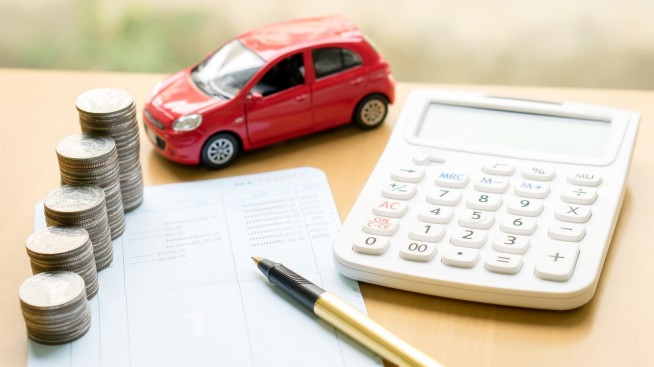What is a lien on a car?

After an extensive amount of research, a successful test drive and confirmation that the cupholder fits your coffee just right — you're finally ready to purchase your new car. As you sign off on your paperwork, one of the documents you’ll see is the lien on your car if you took out an auto loan for your purchase. That may cause you to wonder, “What is a lien on a car?”
To put it simply, a lien is a creditor’s legal claim on an asset, used as collateral until a debt is satisfied. Once you’ve successfully paid off your loan, the lien is released and the car is yours ”free and clear”.
Car liens: An overview
Having a lien on your car often means you’re subject to conditions set by your lienholder (typically, your lender) until your loan is paid in full. This includes things like carrying comprehensive insurance coverage to help protect the asset, until the lender no longer has a financial interest in the car.
Liens could be categorized as being either voluntary or involuntary. Voluntary liens are ones that you enter knowingly, such as the lien on your car in exchange for the auto loan that enabled your purchase. Involuntary liens usually involve the courts and are typically the result of not meeting a payment obligation, possibly to the government or a service provider, or possibly a business or even another person. The lien “ties up” the asset, not allowing you to sell it or transfer ownership, until the lien-holder is satisfied. The lienholder may seize or repossess the asset, or force it to be sold and collect from the proceeds.
What is a lien on a title?
When you buy a car, one of the final documents in the paperwork will be your car title, which establishes you as the official owner. If you choose to finance a car, your lender will hold a lien on your car’s title until you’ve paid off your loan — this can be described as a lien on a title. If you stop making payments or fail to follow your loan agreements, your lender may be forced to repossess your car to collect the debt owed.
What is a lien release?
You may be wondering if there are ways to get a lien release. Liens remain in place for the duration of your auto loan. Once the debt is repaid in full, you receive a lien release. While the process varies on a state-by-state basis, the steps of a lien release usually include:
- The lienholder signing a release document indicating you’ve met the terms of the agreement.
- The document getting sent to your state’s department of motor vehicles (DMV) for processing and review.
- If everything is correct, the DMV transferring the vehicle title to you. Congratulations — you’re officially the owner.
What if I can’t afford my car payment?
If you find yourself struggling to keep up with your car loan payments, there are a couple of things worth considering to help prevent repossession:
- Discuss temporary solutions: Your loan provider may be able to provide you with a hardship assistance program to temporarily reduce or pause your payments. This may give you a limited period of financial relief that allows you time to save money and catch up on your repayment plan.
- Refinancing your auto loan: Although Chase doesn't offer it, refinancing your auto loan may help reduce your monthly payments and make paying off your loan more manageable, but may add to the overall cost of your financing.
Does having an existing lien affect insurance costs?
Having an existing lien typically won’t affect your car insurance rates. However, missed or late payments may affect your credit score, which insurance companies and lenders use to help decide your policy and interest rates. Your lender may also require you to carry a certain level of coverage, which may raise your overall cost.
Buying and selling with a car lien
You’re likely wondering if you are allowed to buy or sell a car that has an existing lien on it. Though neither is impossible, they both require a little know-how.
Can I buy a car with a lien attached to it?
If you buy a used car with a lien, you won’t receive the title until the former owner rectifies the situation and gets the lien released. Private sellers are expected to disclose any known information about liens. If you are buying or financing a brand new car without a previous owner then there shouldn’t be any liens.
When you buy a used car, it’s best practice to:
- Obtain a vehicle history report: Not only would a vehicle history report provide lien and title history, but it would also include prior damage and odometer readings which can be helpful for your buying journey.
- Check your state Department of Motor Vehicle website: Some state DMV websites allow you to inspect a car by entering its vehicle identification number (VIN) or license plate number. Simply request the VIN from the vehicle’s owner and input it into your state DMV website to view any prior registrations, warranty claims, liens and previous insurance coverages.
Can I sell a car with a lien?
You can sell a car with a lien, but the payoff of the lien must be coordinated between the lienholder, seller, buyer, and the providers of any new financing.
It helps to do your research and take time to understand how much you owe on your loan. Additionally, it may be a good idea to get an estimate of your car value and get the best deal possible whether you plan to sell your car to a dealership or to a private party.
In summary
So, what is a lien on a car? It’s your creditor’s legal claim on the asset (your car), being used as collateral until a debt (often your auto loan) is satisfied. If you plan on financing a vehicle, the lien on your car will stay in place until you pay off your auto loan, after which your lien is released and your vehicle is “free and clear.”



